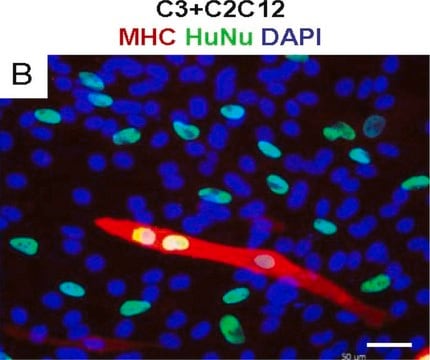MAB1276
Anti-Nuclei & Chromosomes Antibody, histone H1 protein, clone 1415-1
clone 1415-1, Chemicon®, from mouse
Sinonimo/i:
Anti-H1.4, Anti-H1E, Anti-H1F4, Anti-H1s-4, Anti-HIST1H1E, Anti-RMNS, Anti-dJ221C16.5
About This Item
Prodotti consigliati
Origine biologica
mouse
Livello qualitativo
Forma dell’anticorpo
purified antibody
Tipo di anticorpo
primary antibodies
Clone
1415-1, monoclonal
Reattività contro le specie
human, rat
Produttore/marchio commerciale
Chemicon®
tecniche
ELISA: suitable
immunocytochemistry: suitable
immunohistochemistry: suitable (paraffin)
western blot: suitable
Isotipo
IgG2a
N° accesso NCBI
N° accesso UniProt
Condizioni di spedizione
wet ice
modifica post-traduzionali bersaglio
unmodified
Informazioni sul gene
human ... H1-1(3024)
Specificità
Stains nuclei of all human cell types and also stains chromosomes diffusely in metaphase cells. Nuclear staining in interphase cells is intense and diffuse. Antibody reacts with rat cells {Bendeck, 2001}.
Immunogeno
Applicazioni
Stato fisico
Risultati analitici
POSITIVE CONTROL:
Human tonsil
Note legali
Not finding the right product?
Try our Motore di ricerca dei prodotti.
Codice della classe di stoccaggio
12 - Non Combustible Liquids
Classe di pericolosità dell'acqua (WGK)
WGK 2
Punto d’infiammabilità (°F)
Not applicable
Punto d’infiammabilità (°C)
Not applicable
Certificati d'analisi (COA)
Cerca il Certificati d'analisi (COA) digitando il numero di lotto/batch corrispondente. I numeri di lotto o di batch sono stampati sull'etichetta dei prodotti dopo la parola ‘Lotto’ o ‘Batch’.
Possiedi già questo prodotto?
I documenti relativi ai prodotti acquistati recentemente sono disponibili nell’Archivio dei documenti.
Il team dei nostri ricercatori vanta grande esperienza in tutte le aree della ricerca quali Life Science, scienza dei materiali, sintesi chimica, cromatografia, discipline analitiche, ecc..
Contatta l'Assistenza Tecnica.







